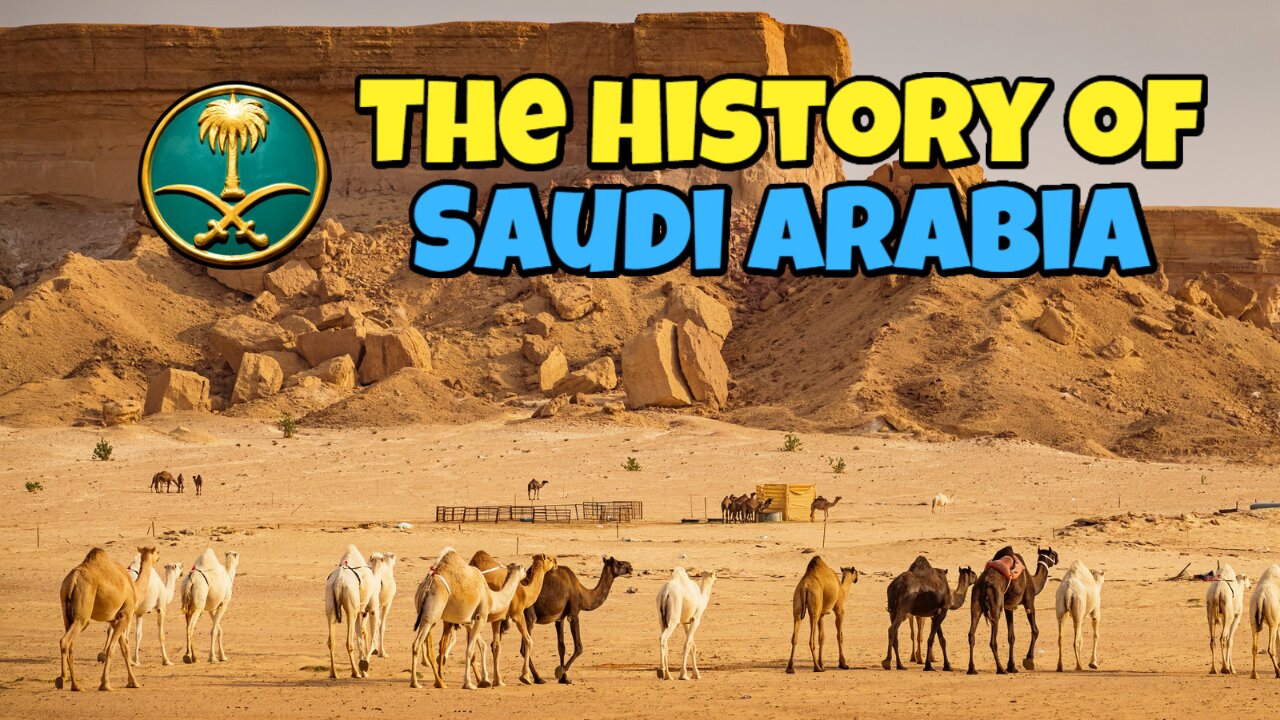Premium Only Content

The History of Saudi Arabia
The history of Saudi Arabia begins with the oldest civilizations on the Arabian Peninsula. The peninsula has had a significant impact on history throughout the ages as a former center of trade and as the birthplace of Islam, one of the world's two major monotheistic religions.
Its metamorphosis has been astounding since the present Kingdom of Saudi Arabia was founded in 1932 by King Abdulaziz Al-Saud. The Kingdom has transformed from a desolate country to a modern, sophisticated state and a significant player on the international stage in just a few short decades.
Ancient History. The Arabian Peninsula has been home to humans for 15,000 to 20,000 years, according to the earliest known physical evidence. Hunter-gatherer tribes roamed the countryside, subsisting on flora and fauna. The environment on the peninsula dried out as the European ice sheet disappeared during the last Ice Age, about 15,000 years ago.
Humans were compelled by this climate change to relocate into the verdant mountain valleys and oases. They had to find a new way to survive since they could no longer hunt and gather. As a result, agriculture flourished throughout the Middle East, starting in Mesopotamia and moving on to the Nile River Valley. Other advancements were made as agriculture developed. Farmers could stockpile food thanks to pottery.
An ancient commercial hub. The Arabian Peninsula served as the hub of the ancient world because it was situated halfway between Mesopotamia and the Nile River Valley, the two major centers of civilization. Caravan routes became commerce arteries that made life possible on the sparsely populated peninsula, and trade was essential to the region's growth
Spices were significant trade goods as well. They were conveyed by caravan after being shipped from India across the Arabian Sea. The massive caravans arrived at the major centers of the north and west after traveling from what is now Oman and Yemen through the important trade routes passing through Saudi Arabia's Asir Province, Makkah, and Madinah The advent of Islam. Muhammad, who was born in the booming commercial hub of Makkah, received a word from God (also known as Allah) through the Angel Gabriel about the year 610. The Prophet Muhammad's followers grew as fresh revelations urged him to declare the unity of God to all people. The Prophet led his people to Yathrib, which was later renamed Madinat Al-Nabi (City of the Prophet), and is today simply known as Madinah, in 622 after becoming aware of a conspiracy to kill him. The Islamic calendar began with the Hijrah, often known as the exodus The Empire of Islam. Less than a century after the advent of Islam, the Islamic Empire reached portions of India and China from Spain. Trade was booming in the Arabian Peninsula even though the governmental centers of power had left the region Another significant influence in the cultural development of the Arabian Peninsula was the establishment of Arabic as the language of international learning. During the so-called "Golden Age," the Muslim world rose to prominence as a hub for knowledge and scientific advancement. Muslim scholars made significant contributions to a wide range of disciplines, including biology, astronomy, philosophy, medicine, the arts, and literature. Saudi Arabia's first state.
Early in the 18th century, Shaikh Muhammad bin Abdul Wahhab, a Muslim reformer, and scholar started promoting a return to the original form of Islam. Local religious authorities and professors originally targeted Abdul Wahhab because they believed that his teachings threatened their bases of influence. In the city of Diriyah, which was governed by Muhammad bin Saud, he looked for safety. Muhammad bin Saud and Muhammad bin Abdul Wahhab made a pact to commit themselves to bring back to the Muslim people the original teachings of Islam. As a result, in 1727, ibn Saud founded the First Saudi State, which flourished under the spiritual leadership of bin Abdul Wahhab, also referred to as the Shaikh. The Ottoman Empire, the preeminent force in the Middle East and North Africa at the time, was suspicious of the Al-Saud kings' popularity and prosperity. Saudi Arabia's second state. The Al-Saud family had retaken governmental power in central Arabia by 1824. The Second Saudi State was founded by Saudi king Turki bin Abdullah Al-Saud in Riyadh, about 20 miles south of Diriyah. From 1924 to 1925, Abdulaziz conquered the whole of Hijaz, including Makkah and Madinah, after establishing Riyadh as his capital. He accomplished this by fusing rival tribes into a single nation.
This is end of this video. Do you feel it nice? Make sure to give your valuable response in our comment section below and don't forget to subscribe to our YouTube channel for more videos.
-
 LIVE
LIVE
Rotella Games
3 hours agoMake the Manor Great Again | The Bread Chronicles | Day 2
274 watching -
 9:26
9:26
Jamesons Travels
23 hours agoShawn Ryan CLOWNS Intel Expert & It GETS WEIRD!
628 -
 LIVE
LIVE
Jewels Jones Live ®
20 hours agoTRUMP'S GOLDEN AGE | A Political Rendezvous - Ep. 105
1,156 watching -
 1:14:28
1:14:28
Michael Franzese
12 hours agoThe Hidden Cause of LA's Deadliest Fires in 2025?
33.6K66 -
 3:59:45
3:59:45
Bitcoin Sports Network
4 hours agoMax & Stacy Invitational Day 2 Part 1 - LIVE from El Salvador
58K8 -
 1:34:30
1:34:30
The Criminal Connection Podcast
5 days ago $1.47 earnedEL PACO: Gypsy Family Wars, Bare Knuckle Boxing, Assassinations and Spirits!
17.5K -
 51:43
51:43
Brewzle
1 day agoI Found Some AWESOME Stores Bourbon Hunting in Des Moines, IA
21.7K1 -
 1:16:54
1:16:54
Kyle Rittenhouse Presents: Tactically Inappropriate
21 hours ago $1.44 earnedReplacing Matt Gaetz Pt. 2
9.41K7 -
 16:08
16:08
inspirePlay
22 hours ago $0.51 earnedCan You Sniff Out the Golf Imposters Before They Wreck the Score?
9.57K2 -
 22:57
22:57
RTT: Guns & Gear
19 hours ago $3.43 earnedPSA Dagger vs. Bear Creek Arsenal BC-102 | The Better Pistol For The Poors
34.9K10